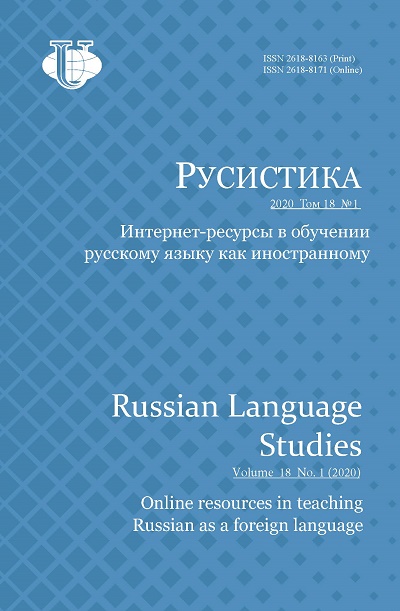Сложносокращенные апеллятивы как автономная разновидность аббревиатур
- Авторы: Теркулов В.И.1
-
Учреждения:
- Донецкий национальный университет
- Выпуск: Том 18, № 1 (2020): ИНТЕРНЕТ-РЕСУРСЫ В ОБУЧЕНИИ РУССКОМУ ЯЗЫКУ КАК ИНОСТРАННОМУ
- Страницы: 97-112
- Раздел: Актуальные проблемы исследований русского языка
- URL: https://journals.rudn.ru/russian-language-studies/article/view/23215
- DOI: https://doi.org/10.22363/2618-8163-2020-18-1-97-112
- ID: 23215
Цитировать
Полный текст
Аннотация
Работа посвящена сложносокращенным апеллятивам, то есть неинициальным нарицательным аббревиатурам, связанным с эквивалентными словосочетаниями отношениями «стихийной» производности (в диахронии) и/или мотивированности (в синхронии). Актуальность исследования определяется тем, что в нем реализуется новый подход к трактовке аббревиации, основанный на выявлении ономасиологически значимых механизмов трансформации производящей единицы в аббревиатуру, а также на разделении синхронного и диахронного подходов к аббревиации. Результаты, полученные при реализации такой трактовки данного явления, обеспечивают возможность создания новых принципов словарного описания аббревиатур. Цель статьи состоит в установлении базовых параметров определения и описания в синхронии и диахронии сложносокращенных апеллятивов как автономной ономасиологической разновидности аббревиатур. Новизна данного исследования состоит в том, что, во-первых, оно обосновывает необходимость отграничения аббревиатур как номинативных единиц, возникших в результате преодоления асимметричного дуализма эквивалентных описательных словосочетаний, от усечений, которые выступают в качестве формальных дублетов сокращаемых слов по причине сохранения ими ономасиологического статуса исходной единицы, во-вторых, в нем определяются причины выделения сложносокращенных апеллятивов в автономный ономасиологический класс аббревиатур, в-третьих, исследование показывает необходимость разграничения синхронного и диахронного подходов к определению и описанию аббревиации. Практическая значимость исследования определяется тем, что его результаты могут быть использованы при составлении словарей аббревиатур.
Ключевые слова
Об авторах
Вячеслав Исаевич Теркулов
Донецкий национальный университет
Автор, ответственный за переписку.
Email: terkulov@rambler.ru
доктор филологических наук, профессор, заведующий кафедрой русского языка филологического факультета
Украина, 283001, Донецк, ул. Университетская, 24Список литературы
- Алексеев Д.И. Аббревиатуры как новый тип слов. Развитие словообразования современного русского языка: сб. науч. работ. М.: Наука, 1966. С. 13-37.
- Алексеев Д.И. Сокращенные слова в русском языке. Саратов: Сарат. ун-т, 1979. 328 с.
- Андронова А.В. Спорные вопросы типологии сложносокращенных слов // Вестник Нижегородского госуниверситета имени Н.И. Лобачевского. Серия: Филология. 2003. № 1 (3). С. 117-123.
- Борисов В.В. Аббревиация и акронимия. Военные и научно-технические сокращения в иностранных языках. М.: Воениздат, 1972. 320 с.
- Васильченко Л.В. Некоторые особенности функционирования усечений аббревиатурного типа // Вопросы русского словообразования. Алма-Ата, 1982. С. 32-36.
- Грамматика современного русского литературного языка / отв. ред. Н.Ю. Шведова. М.: Наука, 1970. 767 с.
- Дерибас В.М. Аббревиатуры русского языка // Русский язык за рубежом. 1992. № 4. С. 48-57.
- Елдышев А.Н. Строение и мотивированность сокращенных слов (к проблеме взаимодействия формально-содержательных признаков в слове): дис. ... канд. филол. наук. М., 1984. С. 162-174.
- Жеребило Т.В. Словарь лингвистических терминов и понятий. Назрань: Пилигрим, 2016. 610 с.
- Зеленин А.В. Дезаббревиация в русском языке // Вопросы языкознания. 2005. № 1. С. 78-97.
- Лингвистический энциклопедический словарь / глав. ред. В.И. Ярцева. М.: Советская энциклопедия, 1990. 685 с.
- Новичков Н.Н. Словарь современных русских сокращений и аббревиатур. Париж - М., 1995.
- Новый словарь сокращений русского языка / под общ. ред. Е.Г. Коваленко. М.: ЭТС, 1995.
- Ракитина Н.Н. Лингвокультурологические аспекты функционирования аббревиатур в политическом дискурсе: aвтореф. дис. ... канд. филол. наук. Челябинск, 2007. 21 с.
- Сергеева Т.С. Аббревиатура в системе лексических сокращений // Филологические науки. Вопросы теории и практики. 2013. № 6 (24). Ч. II. С. 174-179.
- Скляревская Г.Н. Словарь сокращений современного русского языка. М.: Эксмо, 2004. 448 с.
- Словарь сокращений и аббревиатур. 2000-2019. URL: https://sokrasheniya.academic.ru/ (дата обращения: 31.03.2019).
- Словарь сокращений русского языка. 2000-2019. URL: http://www.sokr.ru/ (дата обращения: 30.09.2019).
- Словарь сокращений русского языка. М.: Рус. яз., 1984.
- Теркулов В.И. Сложносокращенные слова: синхронный и диахронный аспекты описания // Вестник Московского университета. Серия 9: Филология. 2017. № 6. С. 73-97.
- Улуханов И.С. Словообразовательная мотивация в русском языке. М., 2003. 349 с.
- Уханов Г.П. Об отношении сложносокращенных слов к словосочетаниям с той же предметной отнесенностью // Научные доклады высшей школы. Филологические науки. 1961. № 1. С. 187-196.
- Фадеев С.В. Словарь сокращений современного русского языка. СПб.: Политехника, 1997. 527 с.
- Филиппова Л.С. Современный русский язык. Морфемика. Словообразование: учeб. пособие. М.: Флинта: Наука, 2009.
- Шанский Н.М. Очерки по русскому словообразованию: учеб. пособие. М.: Изд-во МГУ, 1968. 310 с.
- Ярмашевич М.А. Аббревиация в современных европейских языках: структурный, семантический и функциональный аспекты: дис. ... д-ра филол. наук. Саратов, 2004. 481 с.
Дополнительные файлы














